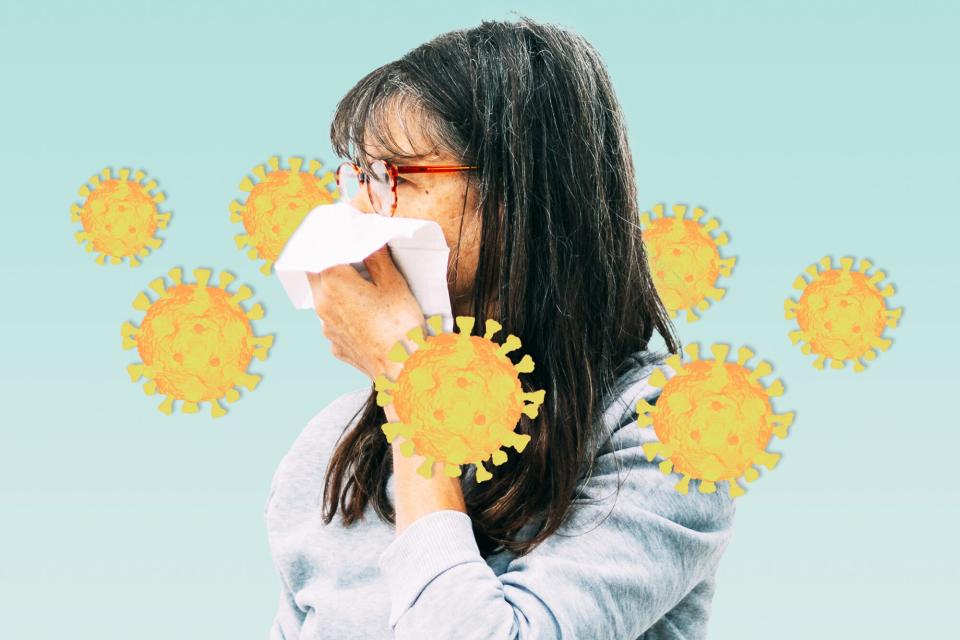What to Do When You Think You Might Have COVID-19, but Can't Get a Test
Earlier this week with positivity rates skyrocketing from coast to coast and case counts topping 1.4 million in one day, we asked, "So will everyone eventually get COVID-19?!" It's a distinct possibility with how easily and rapidly the omicron strain spreads, but the scientific community isn't ready to say with certainty that this influx of cases is what will get us to that elusive herd immunity that might help life return to something closer to normal (or as "normal" as things can be, considering 842,000 and counting Americans have tragically already died from the coronavirus).
At present, many Americans know someone who has tested positive in the last two weeks, have tested positive themselves or think they might have COVID-19. But what do you do if you fall into that latter camp and can't find a test? Drugstores and online merchants are almost always sold out—or selling out in a matter of minutes once restocked—and it can be a challenge to find a slot for a drive-up test that doesn't require an hours-long car line or a weeklong wait at home.
If you think you might have COVID-19 and can't score a test, it's best to act as if you DO have it, health experts agree. (And keep an eye out for local drugstores that offer at-home test delivery, they often restock, and call your local health department for advice about the earliest slots to book IRL.)

Getty Images / Crispin la valiente / BlackJack3D
"If you live in an area with widespread COVID-19 activity, [which is most of America right now] many public health officials are now advising that you assume that you have COVID-19 and act accordingly. If you have mild symptoms and are otherwise healthy without risk factors, then get plenty of rest and isolate according to local health department guidance," Anne Liu, M.D., a specialist in infectious diseases at Stanford University, tells Healthline.
Drink plenty of water, eat a well-balanced, immune-supporting diet, aim to get as much rest as possible and take Tylenol or ibuprofen as needed (and no more than the max daily dose) to reduce aches, pains and fever, if necessary.
Related: I Have COVID—Here Are 7 Things That Have Helped Me Feel a Little Better
The U.S. Centers for Disease Control and Prevention says that anyone who has COVID-19 symptoms should get tested, as should those who have been in close contact for 15 minutes or more with someone who later tests positive. As far as which test is best—when you can find one—"antigen testing picks up cases best if done more than once over several days. Antigen testing may be negative early on, even when symptoms are present," Liu adds to Healthline. "PCR testing is more sensitive, turns positive sooner and remains positive longer. But PCR availability is lower and turnaround time on tests is much longer."
If you have any risk factors for severe COVID-19 or start to feel drastically sicker, for instance, with shortness of breath, confusion, inability to stay awake or persistent chest pain, call your doctor immediately.
Otherwise, isolate at home and try to take a COVID-19 test within one week of exposure or of the onset of symptoms.
"Typically one may be home and isolated for five days from the start of symptoms, then get back out into society with proper mask use. It should be noted that if you are able to remain home for longer [than] those five days, that would be that much safer for others. The next thing to do is to continue to seek out testing sites or home tests," Dana J. Hawkinson, M.D., the medical director of infection prevention and control and an infectious diseases specialist at the University of Kansas Health System, tells Healthline.
Earlier this month, the CDC updated their isolation period guidelines for COVID-19. The following groups should isolate for five days:
Anyone who has been exposed and is unvaccinated
Anyone who has tested positive (symptomatic or not)
Anyone who thinks they might be positive but don't have access to a test
Those without symptoms can end isolation after five days, but should still wear a mask in public and avoid close contact with others until a test comes back negative.
Up Next: Here's What Scientists Say Makes for the Most Effective Face Masks
The situation surrounding COVID-19 continues to change quickly; it's possible that information or data has changed since publication. While EatingWell is trying to keep our stories as up-to-date as possible, we also encourage readers to stay informed on news and recommendations by using the CDC, WHO and their local public health department as resources.

